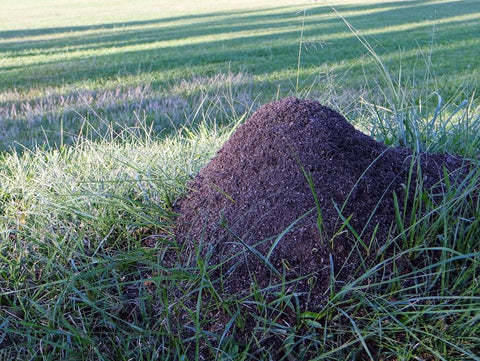Yards and homes seem to be the perfect spot for ant colonies to invade. While some ants are a nuisance, others are more worrisome. One ant to watch out for is the fire ant. These ants come marching in with a sting that will be hard to forget. We’ve gathered information to help you identify a fire ant infestation.
How Do You Identify Fire Ants?

There are two species of fire ants that have very similar behaviors—the red fire ant and the black fire ant. Red imported fire ants, Solenopsis invicta, have a reddish-brown or reddish-black body. Black imported fire ants, Solenopsis richteri, have a brown or black body. Both species range in size from 1.6–5mm. These pests are known for their painful stingers.
What Do Fire Ant Nests Look Like?

Fire ant nests consist of chambers and tunnels beneath the ground. Above ground, they appear as mounds of dirt that are irregular in shape. These nests can be quite large, housing thousands of ants. They have been known to have a diameter of 24 inches, and they can grow several inches high.
Where Do Fire Ants Live & Build Nests?

Fire ants are native to South America. They prefer sunny locations with minimal shade including yards and fields. In the United States, they can be found in warmer climates. They span from Florida to California and as far north as Virginia. These pests are often carried into yards after hitching a ride on trees and plants.
Nests can be found in the soil near trees or under logs and stones. Fire ants will place nests near the structure of homes too. They also have a habit of finding their way into electrical boxes. To build nests, they bring soil with them into the box.
Are Fire Ants Dangerous?

Fire ants are one of the more aggressive ant species. When these ants feel threatened, they’ll attack and often in large numbers. Fire ants release a pheromone that alerts other colony members to danger. Ants answer the call and come to defend their nest.
Fire ants latch onto their victim with their mandibles and then use their stinger to inject venom. This can be painful and cause red, pus-filled bumps that itch. If stung, you will want to keep the area clean to avoid infection. Over-the-counter medicine can help with itchiness and pain. You don’t want to scratch the bumps.
These bites can cause severe allergic reactions that can be fatal. Seek immediate medical attention if you experience nausea, dizziness, or difficulty breathing.
How Do You Prevent Fire Ants?

Preventing a fire ant infestation is always better than having to fight an invading army. Fire ants seek areas with food, water, and shelter, so limiting their access to these things will help. Check out a few tips to avoid these fiery pests.
- Seal interior and exterior cracks or holes to help keep them out of your home.
- Regularly mow your lawn and keep trees and shrubs trimmed.
- Remove leaf piles and woodpiles that can serve as shelter.
- Make sure your trash cans are sealed tightly.
- Eliminate sources of standing water.
- Clean up crumbs and spills to remove sources of food.
- Don’t forget to pick up your pet’s food. Fire ants love to nibble on it.
How Do You Get Rid of Fire Ants?

Fire ant colonies are large and aggressive, which can make it tricky to eliminate an infestation. We’ve gathered a few tips to help you get rid of these ants.
- A bait labeled for fire ants is your best bet for eliminating the entire colony. Ants will carry the bait back to the nest and share it with the colony, including the queen. This will help ensure the colony is completely eliminated.
- Treat your yard when ants are actively foraging—early morning or late evening.
- Remember to be careful. Fire ants aren’t afraid to fight back.
Fire ants can be difficult to control, which is why taking preventative measures is beneficial. If these pests invade your yard, remember to be careful and make sure to use a product labeled for fire ants. If other pests are giving you a fit, we’re here to help! Check out our Maggie’s Farm Simply Effective™ Pest Control products for a more environmentally and family-friendly solution.
